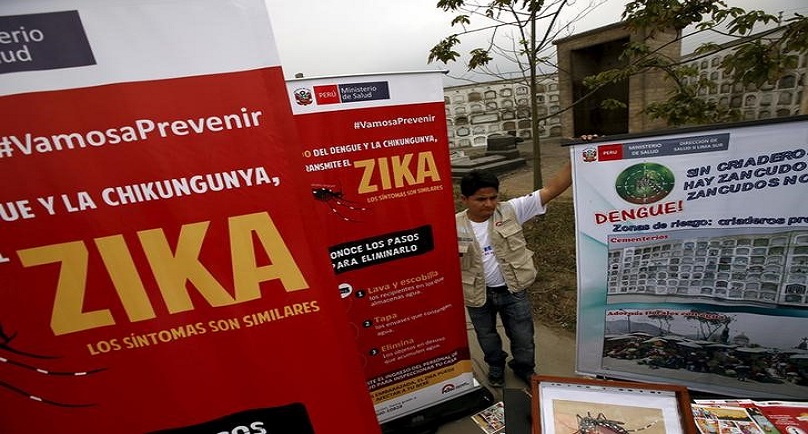Image:A health worker gives information during a preventive campaign against the Zika virus and other mosquito-borne diseases, at the cemetery of Presbitero Maestro in Lima, Peru, February 12, 2016. REUTERS/Mariana Bazo
By Toni Clarke
(Reuters) – U.S. lawmakers on Tuesday approved a bill to provide financial incentives to companies developing treatmen’s for the Zika virus, and the White House said President Barack Obama was expected to sign the legislation although it is insufficient to meet the challenge.
The measure allows the Food and Drug Administration to include Zika drug developers in the agency’s priority review voucher program. The program encourages manufacturers to study treatmen’s for diseases that might not be profitable by expediting the regulatory review of a more lucrative drug in their research pipeline.
The House of Representatives passed the bill on a voice vote, without a roll call, weeks after the same measure was approved by the Senate.
White House spokeswoman Katie Hill said Obama was expected to sign the bill, which she called a “small step” that could encourage the private sector to tackle Zika.
“But it contains no funding and is ultimately insufficient on its own, since it doesn’t provide the $1.9 billion in funding that our public health experts have said is needed right now to prepare Americans for the imminent local transmission of Zika in this country,” she said in a statement.
Democrats and administration officials are urging the Republican-controlled Congress to grant nearly $1.9 billion in emergency funds to combat the spread of Zika. In a temporary fix, the White House said last week that it would redirect $589 million in allocated funds to prepare for the mosquito that carries the disease to emerge in the continental United States.
According to the World Health Organization, there is a strong scientific consensus that the Zika virus can cause the rare birth defect microcephaly in newborns. But the link between the virus and the birth defects has not been scientifically established.
On Tuesday, Brazil confirmed 1,113 cases of microcephaly and considers most to be related to Zika infections in the mother.
Drugmakers who are working on Zika-related drugs, or considering such research, include Sanofi SA, GlaxoSmithKline Plc, Inovio Pharmaceuticals Inc and Takeda Pharmaceutical Co Ltd.
Zika was first detected in Brazil last year and is spreading through the Americas. The World Health Organization had declared a global health emergency due to the virus’s possible link to microcephaly in babies and Guillain-Barre syndrome, a rare neurological disorder, in adults.
On Monday, top health officials said the mosquito that’spreads the virus is now present in about 30 U.S. states, making local outbreaks a possibility. They have also predicted hundreds of thousands of people would be infected in Puerto Rico when the mosquito season kicks in this summer.
A pharmaceutical company may be given a priority review voucher to develop a drug for an infectious disease, in this case Zika, which may not generate much profit for the manufacturer. The voucher gives the company the right to an accelerated review by the FDA of any other, more lucrative, drug in its pipeline.
Developing a new drug can take years and cost millions of dollars. A standard FDA review takes at least 10 months to complete – longer if the agency requires additional information. Being able to shave time off that process and get a profitable drug onto the market faster can be worth millions of dollars to a manufacturer.
Under the agency’s priority review program, companies who submit a drug for review that is intended to treat serious conditions or whose drug shows a significant improvement in safety or effectiveness over existing treatmen’s is eligible to be reviewed in six months, at least four months faster than usual.
A priority review voucher gives a company the right to a six-month review on any product, regardless of whether it meets the conditions normally required to receive an accelerated review. It also gives the company the right to sell the voucher to another company.
The law currently makes any company eligible for a priority review voucher that is developing a drug for one of more than 20 tropical diseases listed under the voucher program. These include malaria, cholera, leprosy, dengue, tuberculosis, and Ebola. The FDA has the authority to add other infectious diseases to the list which primarily affects poor countries.
(Reporting by Toni Clarke and David Morgan in Washington; Additional reporting by Timothy Gardner; Editing by Bernard Orr)
Copyright 2015 Thomson Reuters. Click for Restrictions.


